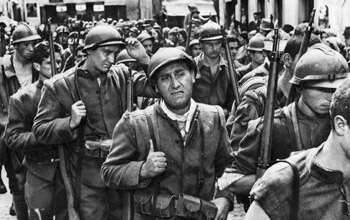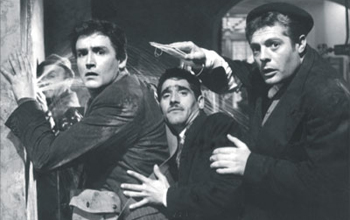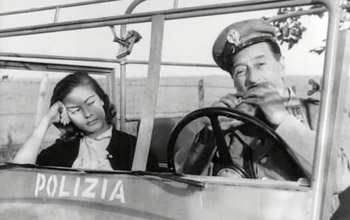
An interview with the late maestro of Commedia all’Italian, Mario Monicelli, which I found on the web and have translated into English.
Q: You don’t feel that the Commedia all’Italiano continues to receive much recognition?
I don’t think so. I’ve had much recognition, fortunately. The very fact that you want to interview me is recognition. I am known, my films are widely released and every now and then I’m invited to some city or other. This helps me discover the world and meet new people, which is I feel an educational experience.
Q: This mixture of elements which you have spoken of regarding the Commedia all’Italiana, is that the case also for the technical elements? So Gianni Di Vinanzo’s photography [on I soliti ignoti] is reminiscent both of that from the noir style or poetic realism, but it’s very different from neorealism. Was that intentional or accidental?
It was something we planned. In Commedia all’Italiana you laugh at the dramas and make a farce out of them. The style of the cinematography must follow this approach, this dramatic aspect that is unique to the genre. Some foreign critics are amazed that we can laugh in this way at drama, in other places it is a tradition that seems very foreign whereas for us it comes naturally.
Q: Thinking of the huge success that you had in the States with I soliti ignoti, what was it that you think made this film so exportable?
It wasn’t only my film, all the Commedia all’Italiana were able to find humour in the least dramatic and tragic of themes.
Q: And this bitterness is the universal element?
Yes, because in fact they’re funny. Not only in Italy,the French laugh at them as well, the Americans, the Chinese. The latter love the Commedia all’Italiano, the dubbing even. You should hear Totò talking in Chinese! They’re universal because the sentiments are the same all over, they don’t change, not from century to century or from land to land.
Q: That links you and the other protagonists of the genre? Risi, Comencini, Germi, Lattuada… Were you aware of being part of a movement or was it something that came spontaneously?

It was absolutely spontaneous. Unfortunately so, as far as I’m concerned. The first film I directed was in the years after the war, in an Italy that had been torn apart by the war and by a criminal and stupid dictator. It was called Toto cerca casa. At that time the home was a very serious theme, and as you can imagine for other reasons apart from humour. This film, though it was crude, it was funny and a big success. We hadn’t studied long and we didn’t know at all if this was the right approach. Another film of the type was Come persi la guerra by Borghesio, a farce on a thorny and sad theme but which managed to be very funny. It even angered Andreotti, who said: “You should wash your dirty linen in your own house, not use it in a film which denigrates Italy, like this one does.” When I decided to do La grande guerra and I was able to shoot it, it was written by Age and Scarpelli and starred Gassman and Sordi, there was a commotion among the Italian press. They said that we wanted to mock the great war and the 600,000 who died in it. But then it was a huge success and it broke this stupid taboo of a false victory and a million soldiers sent to die without food, equipment or arms.
Q: How important do you think the quality of your crew was?
Very, above all in the period immediately after the war. Not only for those of us who made comedies, but for all Italian cinema: Visconti, Fellini, De Sanctis, De Sica… We were always working in a group, in particular during the phase of drawing up the story and screenplay. We were all together, all friends. In the Italian cinema field there were about forty of us, screenwriters, directors and some actors. We saw each other a lot, we went out to eat together, we started the weekend together to have fun, walk and talk. We weren’t jealous of each other, there wasn’t competition between us. Our generation lived in a good way, friendly and profitable. We exchanged ideas, stories, lines, but always without envy.
Q: Perhaps it’s this that’s missing today…
That’s true. I hope that this spirit is reborn, it’s indispensable for make projects that successfully represent reality.

Q: So what do you think of the new breed of Commedia italiana?
I think that there is a good recovery. The young filmmakers of today have rediscovered this way of working together, without pretending to do everything by themselves as it was for the two preceding generations: they’d write the screenplay, direct it and sometimes also act in it as well. Now I think that these young people are of their own generation, of the reality that surrounds them, of the problems that they face, their illusions and delusions. Not like the preceding generation, who tried to make imitations of Antonioni, Fellini or Visconti. These filmmakers don’t make imitations, they make their own films and this attracts the Italian public, who finally see themselves represented authentically. I have a lot of faith in this new generation.
Q: Among others, Virzi cites you as a maestro…
I’m not a maestro of anything and I wasn’t a student of anyone. Everything came in itself.
Q: Regarding Amici miei, can you tell us anything about why Germi chose you and when did you take over?
Because we were good friends. We’d known each other since the end of the forties, when I was his assistant on Il testimone, his first film. After that we saw each other often and became friends. Germi was a person who was difficult to handle, he had a cantankerous character, self-contained, but we could spend a lot of time together. We’d chat, we’d argue. We held each other in esteem. And so when he wasn’t able to shoot Amici miei because he was unwell, he had terrible cirrhosis, he thought of me. Also because it was a story with Tuscan characters, the scriptwriter was Tuscan and I knew him because we had already worked together. It was a subject with which I would be comfortable, because I’m also Tuscan and I know all these stories that are told in Florence. Germi wanted to set it in Bologna and when he called me to get involved I proposed moving it to Tuscany, seeing as how I was born there. He agreed and that’s what we did.
Q: What kind of relationship did you have with the censor? Toto e Carolina had particular difficulties?

Not only Toto e Carolina, I also had to make lots of cuts to Guardia e ladri, change some lines and many other things. Fortunately the whole of Italian cinema was anti-censorship and so we helped one another… We went to the appeal courts and battled against the commission. And by don’t of fighting this institution we dismantled it and now it practically doesn’t exist any more. A true censor would be against the exultation of warfare and sex. Young people watch and they learn to kill as if it’s nothing, they have a bad view of sex. The television teaches us things that we didn’t see when I was a boy and I don’t want to see today.
Q: Your career is often intertwined with that of other great figures from our cinema. In particular, do you recall any anecdotes regarding Sordi?
(Laughs). There are only a certain amount of anecdotes that I can tell and each time I’m interviewed I’m asked to tell an anecdote. I’m not a collector of anecdotes! Thousands of things have happened in my career but I don’t remember them all and so I can’t speak about them. And I’m happy not to speak of them, you’ll have to find something you can write about me instead.
Q: Do you have any upcoming projects?
There is one, I hope it takes off because it has been a long time in preparation. It’s a film called L’uomo nero after a card game played by children which I believe is now forgotten. You discard all the doubles and in the end there’s one card remaining, called L’uomo nero, and you have to do a penance.
Q: One final question, what films have you been struck by recently?
In recent years, among the Italian films, I have been most taken with Un uomo in piu by Sorrentino. Then there are other directors, for example Marra, Crialese, Ozpatek, Muccino, Soldini, Infascelli, Piccioni, Giordana. The cinema is firstly an industry and then an art form. If the films have the backing of the public then you are able to take more risks economically because this kind of production has an audience, so you can do things, otherwise you can’t. Now there are films that are attracting the public whereas for twenty years there wasn’t anyone going to the cinema.
